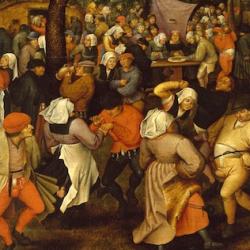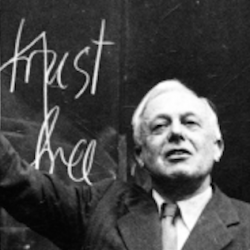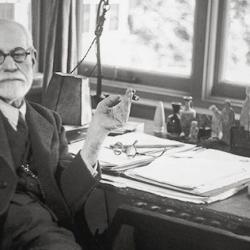Theories of language, Rosenstock-Huessy comments, focus almost exclusive attention on the speaker or writer, and almost none on the listener: “Our philology is built around the process of talking, speaking, writing.” Listening is emphasized in “military training for obedience, understanding to psychology, listening and learning to acoustics and education.” But all speech is a two-pole process, and the listener’s role is not merely receptive and passive. “Language,” he emphasizes, “is not speech, it is a full circle from word to sound to perception to understanding to feeling, to memorizing, to acting and back to the word about the act thus achieved.”
Listening occurs in a variety of ways and takes a variety of forms, and contrary to our initial impressions, listening involves more than the ear. Rosenstock cites a Dutch grammarian, van Ginneken, who claims that the body is involved in listening in at least four ways: “The innervation of the whole system of respiration and oration, the gesture system of the rump, head and hands, our sense of audition, and our sense of vision.” To hear and understand, “we need not only our ears and eyes. We also must feel free to innervate our larynx, tongue, mouth, etc., and we must feel able to re-enact some of the gesticulations of the interlocutor.”
Roosenstock-Huessy lists eight “participating enactments” needed for perfect listening: hearing noise, sounds, vowels; re-innervating the speaker’s consonants; registering the complete word, sentence, phrase; recalling the conceptual meaning; re-enacting the emotions behind the phrase; re-enacting the representations condensed into the word; re-enacting the process represented; getting the word out of his system, forgetting it.
Most of the time, listening registers only in the memory. But this is an incomplete listening, not only because there is a time to forget but because memory is potentially paralyzing. A teacher who has come to his convictions after years of difficult labor tries to pass on his insights to his students, who “merely remember,” registering the interesting fact and moving on to something else: “Any philosophy is deteriorated by the fact that it is memorized by the disciples.” Memorized words might be followed in letter but not in spirit; he points to the example of
Speaking and listening also has an emotional charge, and the purpose of speaking is to move the listener with the same passions that the speaker possesses. Propaganda breaks this unity: The propagandist declares what it does not believe, and arouses feelings in the listeners that he never possessed. Speaking should arose emotion, but only on condition that “the speaker himself is moved, too.” This discrepancy “between the investment made by the speaker and the speculative results he thinks he may produce in the listener” is a form of lying. Rosenstock recognizes that saying and doing are often distributed between speaker and listener. That is not the problem. The problem occurs when the speaker attempts to rouse the listener to something the speaker has no interest or investment in, and which the speaker does not consider true or good: “The purpose of speech is to animate the listener to the degree to which the speaker is animated. When the speaker is not animated, it is diabolical to animate the listener.” I don’t think that “diabolical” is hyperbole.
Social disintegration happens when there is a breach between speakers and listeners. Rosenstock-Huessy lists forms of speech with corresponding responses of the listener, showing that a social breakdown can occur at any of these points: Chat-smile, talk-listen, tell-remember, teach-learn, sing-feel, command-obey, argue-understand, prophesy-carry out.
He focuses his discussion of listening specifically on the problems of education. If a speaker is to speak effectively, the listener must be prepared to listen, and he becomes prepared only when he expects extraordinary things: “He must be hungry before we can feed him.” Contemporary students are not hungry: “He is blasé, he is indifferent, he is skeptical, he is shy, he is outside the world of which we talk and into which we try to talk him, the world of eternal life.” Nothing but authority, an imperative, will open his years to listen, and all teaching and learning rests on an imperative. ERH cleverly shows that Frost’s “two roads” is not what it appears – a poem embodying the modern idea, “Don’t let anybody tell you.” If Frost actually believed that, he wouldn’t tell people to take the road less beaten. All history is made by men taking un-beaten tracks (which then often become beaten tracks), but men take unbeaten tracks when they are told to: Alexander conquered and Charles V abdicated because they “{had the good fortune of having listened to inspired speech.” Men make history because some speaker has become victorious in his teaching.
How can students be inspired to learn, learn to be expectant again? Much of the answer depends on institutions and practices outside the academy. They have been taught that college education is normal, simply the “next school” rather than a “first campaign in the spiritual militia.” No authority sends students to college, and so they have no “public inspiration or authority.” Much of the “effectiveness of our teaching depends on the poetic and artistic life, the loyalties and customs, the family and politics of the country.” Within the academy, ERH says that students can become expectant if faculty and administration work together to educate, if teachers see themselves as “obstacles and difficulties” to their students rather than as facilitators, if students spent a year out of school before attending college, and if the curriculum is arranged to take students “through the mental phases that homo sapiens, man, because he speaks, has to pass through.”
Typically, Rosenstock-Huessy muses on the different attitudes toward time of speakers and listener. On the surface, it appears to speaking and listening, teaching and learning, are a simple give and take: “The teacher seems to give; the student seems to take.” In reality, things are more complicated. Before the teacher has something to say, he needs to take time to gain the right to say what he says and to insist on its importance. Listeners, moreover, give time: “the listening process depends on the recklessness with which the listener forgets all time limits, all end of class schedule, and listens, completely forgetful of any end of time.”
One final note (and I ignore several important and interesting twists in the discussion): He returns at the end of this discussion to a concern with imperatives. Imperatives are emancipating, not confining; Love God and your neighbor as yourself are the most freeing words ever spoken. And a command cuts through the confusion and paralysis of indecision and forces us to action. We act only if we are “able to hear without [ourselves] the clear-cut alternative: shall I do this, or not do this?” The “disease of our time” is a problem of “conflicting suggestions in great number,” and only an authoritative “Do this” cuts through and leads to action.
The fundamental imperative, however, is the imperative “Listen” or “Be interested.” This is not only the general imperative behind all other imperatives, but it is the imperative behind all other forms of speech. The scientist carries out his objective science in response to a summons, “Let there be science!” Rosenstock illustrates the more general point by thinking through the phrase “The darkened moon.” This may be a piece of lyrical speech, part of a poem; it might be a narrative, part of a story; it could be a phrase from a scientific treatise. But behind all these is the imperative: “Look, the darkened moon.” Each of these is intonated differently: The poetic speech is rhythmical and emotional, the factual definition is pronounced with accent, the story aims at propriety. But these all depends on an emphatic statement, “Look! A Darkened Moon! Pay attention! Listen! Hear!”















